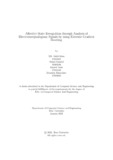Affective state recognition through analysis of electroencephalogram signals by using extreme gradient boosting
Abstract
Emotion analysis has become a very important aspect in everyday life. It gives a detailed understanding of the behavior of human. In this research, we have focused on three dimensions of emotion. These are arousal (calm or excitement), valence (positive or negative feeling) and dominance (without control or empowered). We have collected dataset called DREAMER from a secondary source, consisting of Electroencephalogram signals from 23 participants, recorded on different 18 stimulus tests for each participant, and also pre-trial signals, along with self-evaluation ratings of all the dimensions for each stimuli at a scale between 0 and 5. In our proposed work, we have applied various feature extraction techniques which are FFT, DCT, poincare, power spectral density, Hjorth parameters which are activity, mobility, complexity, statistical features such as mean, median, maximum, variance, skewness. Additionally, chi-square and recursive feature elimination technique was used to select the discriminative features. Then, we have used, machine learning models such as support vector machine and extreme gradient boosting for classification. Finally, the 10 fold cross validation technique was performed to find the accuracy for each dimension separated in two classes (high or low). Here, extreme gradient boosting provided us better results with mean accuracy of 95.174% for arousal, 87.456% for valence and 84.541% for dominance, which is significantly higher than the state-of-the-arts.

